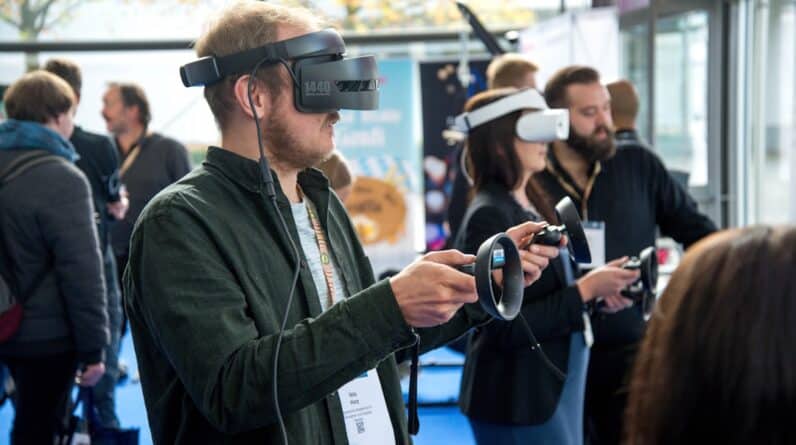As you delve into the fascinating intersection of artificial intelligence (AI) and biology, you will discover a realm where technology and life sciences converge to revolutionize our understanding of living organisms. The integration of AI into biological research is not merely a trend; it represents a paradigm shift that enhances the capabilities of scientists and researchers. By harnessing the power of machine learning, data analytics, and computational models, AI is transforming how you approach complex biological questions, enabling you to analyze vast datasets and uncover patterns that were previously hidden.
In recent years, the exponential growth of biological data has created both opportunities and challenges. You may find yourself overwhelmed by the sheer volume of information generated from genomic sequencing, clinical trials, and ecological studies. AI serves as a powerful tool to navigate this complexity, allowing you to extract meaningful insights from large datasets.
As you explore this dynamic field, you will come to appreciate how AI not only accelerates research but also opens new avenues for discovery, ultimately leading to advancements in healthcare, environmental science, and beyond.
Key Takeaways
- AI is revolutionizing the field of biology by enabling the analysis of large and complex datasets, leading to new insights and discoveries.
- AI is being used in life sciences for applications such as drug discovery, genomics, personalized medicine, and more, with the potential to revolutionize healthcare.
- Advantages of AI in biology include its ability to process and analyze large amounts of data quickly, while limitations include the need for high-quality data and potential biases in algorithms.
- AI is transforming drug discovery by accelerating the process of identifying potential drug candidates and predicting their efficacy and safety.
- AI is playing a crucial role in genomics by analyzing large-scale genomic data to understand genetic variations, disease mechanisms, and potential treatment options.
Applications of AI in Life Sciences
Enhancing Medical Imaging
In medical imaging, AI algorithms are being employed to analyze radiological images with remarkable accuracy. By training on vast datasets of medical images, these algorithms can assist radiologists in detecting anomalies such as tumors or fractures more efficiently than traditional methods. This not only enhances diagnostic accuracy but also reduces the time required for image analysis, allowing healthcare professionals to focus on patient care.
Advancing Epidemiology and Public Health
AI is playing a pivotal role in epidemiology and public health. AI-driven models are being utilized to predict disease outbreaks and track the spread of pathogens. By analyzing data from various sources, including social media, travel patterns, and environmental factors, AI can provide valuable insights that inform public health interventions. This proactive approach enables more effective responses to emerging health threats, ultimately saving lives and resources.
Transforming Healthcare
The impact of AI in life sciences extends beyond medical imaging and epidemiology. As you explore this field, you will discover the numerous ways in which AI is transforming healthcare, from streamlining clinical workflows to enabling personalized medicine.
Advantages and Limitations of AI in Biology
As you navigate the landscape of AI in biology, it is essential to weigh both its advantages and limitations. One of the most significant advantages is the ability of AI to process and analyze large datasets at unprecedented speeds. This capability allows you to uncover correlations and trends that would be nearly impossible to detect through manual analysis.
Additionally, AI can enhance predictive modeling, enabling you to forecast biological phenomena with greater accuracy. This predictive power is particularly valuable in fields such as drug development and personalized medicine, where understanding patient responses can lead to more effective treatments. However, despite its many benefits, AI in biology is not without its challenges.
One limitation lies in the quality and representativeness of the data used to train AI models. If the data is biased or incomplete, the resulting predictions may be flawed or misleading. Furthermore, as you engage with AI technologies, you may encounter issues related to interpretability.
Many AI algorithms operate as “black boxes,” making it difficult for researchers to understand how decisions are made. This lack of transparency can hinder trust in AI-driven conclusions and raise concerns about accountability in critical applications such as healthcare.
AI and Drug Discovery
In the realm of drug discovery, AI is proving to be a game-changer. As you explore this area, you will find that traditional drug development processes are often lengthy and costly, with high rates of failure. However, by leveraging AI technologies, researchers can streamline various stages of drug discovery.
For instance, machine learning algorithms can analyze chemical compounds and predict their potential efficacy against specific diseases. This capability allows you to identify promising candidates more quickly than conventional methods would permit. Moreover, AI can assist in optimizing clinical trial designs by identifying suitable patient populations and predicting their responses to treatment.
By analyzing historical clinical trial data, AI can help you design trials that are more likely to succeed while minimizing risks for participants. This not only accelerates the drug development timeline but also reduces costs associated with failed trials. As you witness these advancements unfold, it becomes clear that AI is not just a tool; it is a catalyst for innovation in the pharmaceutical industry.
AI and Genomics
The field of genomics has been profoundly impacted by the integration of AI technologies. As you delve into this area, you will discover how AI is revolutionizing our understanding of genetic information. With the advent of next-generation sequencing technologies, vast amounts of genomic data are generated daily.
Analyzing this data manually would be an insurmountable task; however, AI algorithms excel at processing large datasets efficiently. AI can identify genetic variants associated with diseases by analyzing genomic sequences alongside clinical data. This capability allows you to uncover insights into the genetic basis of complex conditions such as cancer or rare genetic disorders.
Furthermore, machine learning models can predict how specific genetic variations may influence drug responses or treatment outcomes. As you engage with these technologies, you will appreciate how AI is paving the way for a deeper understanding of genomics and its implications for personalized medicine.
AI and Personalized Medicine
The Role of AI in Personalized Medicine
Artificial intelligence (AI) plays a vital role in enabling personalized treatment strategies. By analyzing vast amounts of patient data, including genomic information, medical histories, and lifestyle factors, AI algorithms can identify patterns that inform treatment decisions. This enables healthcare professionals to develop targeted treatment plans that are tailored to each patient’s unique needs.
Revolutionizing Cancer Treatment
One area where AI-driven personalized medicine is making a significant impact is in cancer treatment. By analyzing a patient’s specific genetic mutations, AI can help oncologists determine which therapies are most likely to be effective. This targeted approach not only improves treatment outcomes but also minimizes unnecessary side effects associated with ineffective therapies.
A New Era in Patient Care
As AI continues to advance, it is clear that personalized medicine has the potential to revolutionize patient care. By providing more precise and effective treatments, this approach can improve health outcomes, reduce healthcare costs, and enhance the overall quality of life for patients. As we move forward, it will be exciting to see the continued evolution of personalized medicine and its potential to transform the healthcare landscape.
Ethical Considerations in AI in Biology
As you engage with the transformative potential of AI in biology, it is crucial to consider the ethical implications that accompany these advancements. One significant concern revolves around data privacy and security. The use of personal health information for training AI models raises questions about consent and confidentiality.
You may find yourself grappling with the challenge of balancing innovation with the need to protect individuals’ rights. Additionally, issues related to bias in AI algorithms warrant careful consideration. If the data used to train these models is not representative of diverse populations, there is a risk that certain groups may be disadvantaged in healthcare outcomes.
As you navigate these ethical dilemmas, it becomes clear that fostering transparency and accountability in AI development is essential for building trust among stakeholders.
The Future of AI in Life Sciences
Looking ahead, the future of AI in life sciences appears promising yet complex. As you contemplate the trajectory of this field, it is evident that continued advancements in technology will further enhance the capabilities of researchers and healthcare professionals alike. The integration of AI with other emerging technologies—such as genomics, biotechnology, and robotics—will likely lead to unprecedented breakthroughs in our understanding of biology.
Moreover, as regulatory frameworks evolve to keep pace with technological advancements, you may witness increased collaboration between academia, industry, and regulatory bodies. This collaborative approach will be essential for addressing ethical concerns while maximizing the benefits of AI in biology. As you embark on this journey into the future of life sciences, remain open to the possibilities that lie ahead; the fusion of AI and biology holds immense potential for improving human health and advancing scientific knowledge in ways we have yet to fully comprehend.
AI in Biology: the Future of Life Sciences is a fascinating topic that explores the potential impact of artificial intelligence on the field of biology. One related article that delves into the use of AI in enhancing productivity and user experience is AI-Powered Virtual Assistants: Enhancing Productivity and User Experience. This article discusses how AI-powered virtual assistants can streamline tasks and improve efficiency in various industries, including the life sciences. It provides valuable insights into the ways in which AI technology can revolutionize the way we work and interact with information.
FAQs
What is AI in Biology?
AI in Biology refers to the use of artificial intelligence (AI) technologies in the field of biology to analyze, interpret, and make predictions based on biological data. This includes applications such as drug discovery, genomics, personalized medicine, and bioinformatics.
How is AI used in Biology?
AI is used in Biology to analyze large and complex biological datasets, identify patterns and correlations, predict biological outcomes, and assist in the development of new drugs and therapies. AI algorithms can also be used to model biological systems and simulate biological processes.
What are the benefits of using AI in Biology?
The use of AI in Biology can lead to more efficient drug discovery, personalized medicine, and disease diagnosis. It can also help researchers gain new insights into complex biological systems and accelerate the pace of scientific discovery in the life sciences.
What are some examples of AI applications in Biology?
Some examples of AI applications in Biology include the use of machine learning algorithms to analyze genomic data, predict protein structures, and identify potential drug targets. AI is also used in medical imaging analysis, biomarker discovery, and patient stratification for clinical trials.
What are the challenges of using AI in Biology?
Challenges of using AI in Biology include the need for high-quality and diverse biological data for training AI models, the interpretability of AI-generated results, and the ethical considerations surrounding the use of AI in healthcare and life sciences. Additionally, there are challenges related to the integration of AI technologies into existing biological research workflows.






